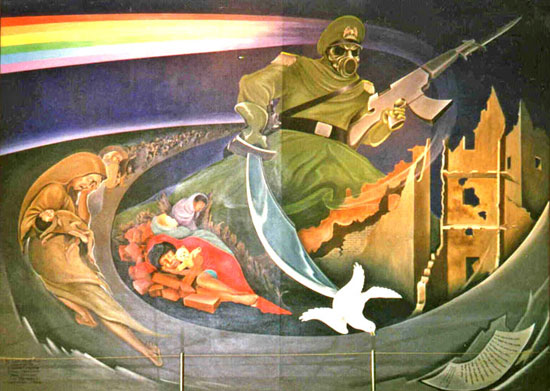Tags: Deus Ex; Harvey Smith; Majestic Revelations; Sheldon Pacotti
Eurogamer offers a retrospective article about the first version of Deus Ex's plot, back when the game was still known as Majestic Revelations, with contributions from Sheldon Pacotti and Harvey Smith. Have a snippet:
Spotted at Gamebanshee
Eurogamer offers a retrospective article about the first version of Deus Ex's plot, back when the game was still known as Majestic Revelations, with contributions from Sheldon Pacotti and Harvey Smith. Have a snippet:
Story wasn't the only reason for editing Deus Ex away from its original vision, however - fiscal and technological realities played a role too. Sheldon mentions a mid-game level in the White House level as a particularly complex task for the level designers to realise and the decision was ultimately made to focus that effort elsewhere. In a post-mortem lecture filmed in 2008, Warren Spector lays decisions like this at the feet of designer Harvey Smith.
"On a daily basis I was building the rooms," explains a humble Smith. "So, I knew how big a room could be before the renderer would choke and how many guys we could have on screen. I had an intimacy with the tools."
Armed with this technological understanding, Smith approached Spector and argued for what he considers the two most critical changes to the original vision. The first was a new skill system with fewer abilities but more demonstrable effects - so the guns didn't do more damage but instead got easier to use as you advanced. The second was a trimmed down version of the story that abandoned the Mexican invasion and space stations in order to become more technologically feasible and narratively intimate.
"If you think of a game from outside you very often add way too much to it and way too many characters," explained Smith, retrospectively. "That's fine if you're making a sim game, but very often a story is about just a handful of characters. And I think that was part of the problem; I had this sense that [Majestic Revelations' plot] was too crazy, too much."
Smith's new version of the plot sought to reuse completed assets wherever possible, but abandoned sections that weren't already in development. Much of Majestic Revelations would have been set in war-torn Texas or bizarrely around Denver airport, but these ideas were never even prototyped, discarded to allow focus elsewhere. An underwater city in a flooded Hollywood valley became a secret MJ12 research base. The Helios space station where the game would have ended (with nuclear explosions in space, no less) was repurposed for Area 51, meaning the team didn't have to struggle with coding zero-gravity combat.
"On a daily basis I was building the rooms," explains a humble Smith. "So, I knew how big a room could be before the renderer would choke and how many guys we could have on screen. I had an intimacy with the tools."
Armed with this technological understanding, Smith approached Spector and argued for what he considers the two most critical changes to the original vision. The first was a new skill system with fewer abilities but more demonstrable effects - so the guns didn't do more damage but instead got easier to use as you advanced. The second was a trimmed down version of the story that abandoned the Mexican invasion and space stations in order to become more technologically feasible and narratively intimate.
"If you think of a game from outside you very often add way too much to it and way too many characters," explained Smith, retrospectively. "That's fine if you're making a sim game, but very often a story is about just a handful of characters. And I think that was part of the problem; I had this sense that [Majestic Revelations' plot] was too crazy, too much."
Smith's new version of the plot sought to reuse completed assets wherever possible, but abandoned sections that weren't already in development. Much of Majestic Revelations would have been set in war-torn Texas or bizarrely around Denver airport, but these ideas were never even prototyped, discarded to allow focus elsewhere. An underwater city in a flooded Hollywood valley became a secret MJ12 research base. The Helios space station where the game would have ended (with nuclear explosions in space, no less) was repurposed for Area 51, meaning the team didn't have to struggle with coding zero-gravity combat.
Spotted at Gamebanshee







![Have Many Potato [2013] Codex 2013](/forums/smiles/campaign_tags/campaign_potato2013.png)
![The Year of Incline [2014] Codex 2014](/forums/smiles/campaign_tags/campaign_incline2014.png)















![Glory to Codexia! [2012] Codex 2012](/forums/smiles/campaign_tags/campaign_slushfund2012.png)









